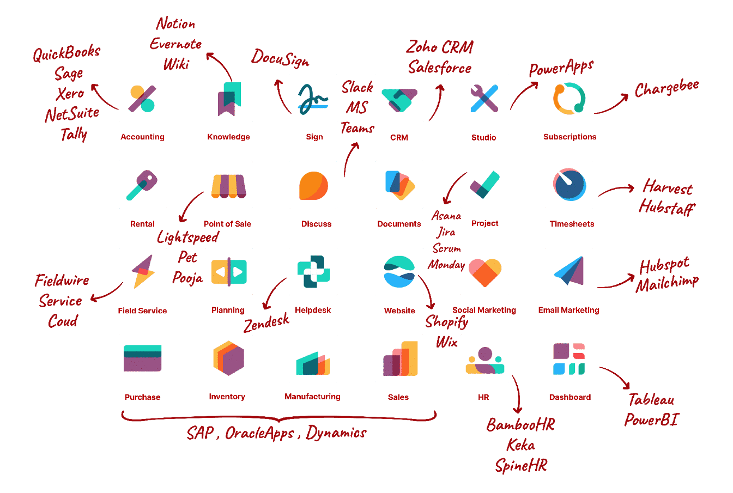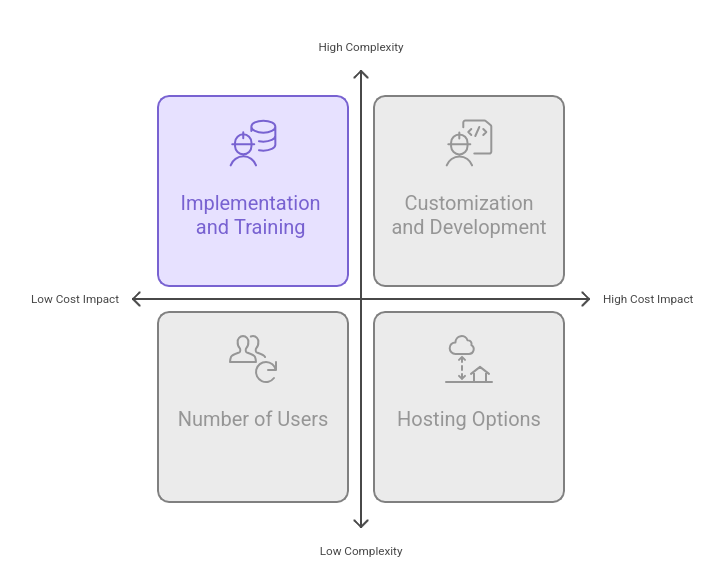Nowadays, all businesses need business suites to manage their routine operations. Different departments often use various solutions to manage their business operations which tend to buy different subscriptions for other solutions. At the broader level and in the long term, it will become necessary to have a one-stop solution for all the departments of an organization. This ensures all the business operations keep connected and management can look at how their business is running in one place. Now, if we opt for such ERP for your business then one question that will always buzz around is what will be the cost for implementation, and what will be the recurring cost?
Brief Overview of Odoo ERP
Odoo stands for On-Demand Open Object. It is a business suite to manage business operations of Sales, Procurement, Warehouse, Manufacturing, Healdesk, Accounting, and many more. The source code for the framework and core ERP modules is curated by the Belgium-based Odoo S.A. There are two different Editions of Odoo: the Community and Enterprise versions. Using the Enterprise edition is possible on the company’s SaaS and accessing the code is restricted to Enterprise customers and partners. The Community version is freely available to anyone.
There are 46 core modules found in the Odoo ERP that are classified according to various fields as follows: sales, marketing, manufacturing, human resources, and accounts. These modules work either alone or collectively and support the smooth running of businesses.

Odoo Enterprise Pricing Model
If you are new to an ERP venue like Odoo, the first thing that should pop up in your head is how pricing works. Odoo Enterprise has customers at the heart for quickly growing up and helps companies from small startups to large enterprises with the flexible per-user pricing structure.
Modular Pricing: Pay for What You Need The best thing is that Odoo already removed the modular pricing approach. Now, you don’t need to pay any cost for a different application or modules you want to use. You just need to pay for the user license cost which means you can use all the apps and onboard all the department’s users and their business process.
Odoo Enterprise User-Based Pricing: Scale With Your Team, Odoo Enterprise is one of the earliest adopters to bring only per-user license cost. User-based pricing model: As your team grows, you can process for their user licenses, since this is a user-based pricing model. It is as straightforward to compute and budget for the requirements of your team because you know how much each user costs. You can simply start with Odoo – no matter how many employees you have, or plan to add later.
Hosting Options: Cloud vs. On-premise Odoo Enterprise is hosted in three ways: Odoo Online | Odoo.sh (Cloud) | On-Premise. But keep in mind that Odoo Online covers hosting, maintenance, and upgrades which usually come separately with an On-Premise license as servers do not come free, and neither does their maintenance or IT support to tweak everything forever. For Odoo.SH , you need to pay the cost based on database size, workers and staging server space. The cost depends on the hosting options you go for and therefore, it is important to evaluate your business infrastructure and long-term goals before making that choice.
Support and Upgrades: Continuous Value One of the advantages of Odoo Enterprise is that you will always have professional assistance covered and will also have upgrades from time to time. The subscription model ensures regular provision of the latest updates and improvements in features in addition to technical assistance in case you encounter problems. In addition, Odoo provides three years of support for any version after release for free for base features of version. For more information, kindly visit this link.
Transparent Pricing: No Hidden Costs Odoo ensures that there are no surprises in the pricing model because the idea here is to be clear and frank with customers. You can also easily ascertain whether you are incurring extra costs on things like additional users, the hosting services in the case of odoo.sh. This is important for companies that want to spend on a powerful ERP solution but want to be cost-conscious as well.
Odoo Implementation Cost
Deciding to implement Odoo ERP solutions can be fundamental for your business transformation; however, understanding its cost implications is necessary for proper budgeting and planning. The cost of Odoo's implementation is influenced by many different elements, and therefore, it is vital to understand your business requirements before going deep.
Scope of Implementation:
The scope of implementation is the first most critical aspect in determining the cost. Are you planning to implement only a small number of modules or do you want all modules deployed? The more modules add-ons and customizations you ask for, the more expensive it gets. A simple, out-of-the-box implementation could consist of basic modules like CRM, Sales, Purchase and Inventory. A more sophisticated implementation could have modules related to HR, Manufacturing, etc., thus increasing the cost.
Customization and Development:
Customization is one of Odoo's highlight attributes as it is very flexible. However, with that comes the other side of the customization that can substantially affect the overall implementation cost. Whether it is the need to alter the way workflows are carried out, designing custom modules, and/or modifying the existing flow or third-party integrations, all these modifications call for extra man-hours and its impact on the billing part.
Transference of Data:
The plan to transfer all data from existing systems to Odoo is also another area that may impact the costs of implementation of the ERP system. Migration of data involves complex structures based on the volume and nature of the data to be migrated since it can be as simple as the push of a button or complicated, requiring intensive and prolonged effort so that all the files can be properly managed. It is important to take every step to ensure that there are no problems during data transfer because they can impact the performance and the normal functioning of the new system since the day of adjustment is crucial.
Sustained Hand-Holding:
The extent to which your team can be able to accept the introduced changes largely determines the overall approach during ERP implementation. Odoo does have different training programs but spending some more money on custom Odoo training for your employees will make the process more effective. In addition, total costs may be affected by ongoing support that is necessary even after the implementation to alleviate any problems or changes that may arise.
Partner vs. In-House Implementation:
Deciding whether to implement Odoo through an official Odoo partner or do it by yourself. Taking the do-it-yourself route might seem more economical but going to an Odoo partner’s experience usually ensures a faster and more effective deployment with minimal errors committed. However, such expertise does come with a price.
Odoo Community Pricing
For businesses looking for ERP solutions, Odoo Community presents an interesting alternative: it is a no-cost open-source version of Odoo with many features, but make sure you review the difference between community and enterprise before you make any decision. However, the question remains, what does “free” mean when it comes to Odoo Community, and more importantly, how is it different from other options present in the market?
Zero Cost of License:
Zero Cost of License:
Real Practical Benefit This unique feature of Odoo Community does not have any licensing fee and has gained popularity among people most especially in the SME segment. Due to the nature of being open-source, Odoo Community offers the businesses the central ERP features sans the liabilities of subscription fees. This is why it tends to be a perfect solution for orienting startups, small enterprises, or, in general, any kind of organization willing to cut down costs yet have access to robust systems of ERP.
Core Features:
Core Features:
Necessary Precisely When You Need It Odoo Community includes several core elements allow to satisfy many business processes, such as Sales and CRM, Inventory, and Project Management. Although the Odoo Community edition does not contain some of the sophisticated features and integrations present in Odoo Enterprise software, it has more than sufficient features for companies with simple requirements. This one is ideal for tech users who just need basic features that do not have any complexities or expensive features.
Customization and Flexibility:
Customization and Flexibility:
Do It With Your Own Style Because it is open source, Odoo Community allows extensive customization. Companies with their development department can also alter the source code according to their business logic, develop their third-party applications, or combine them with other existing ones. This is a huge benefit for businesses having requirements of extreme customization but cannot pay the cost of the Enterprise version.
Implementation and Maintenance:
Implementation and Maintenance:
These are hidden Expenses Even though the software is free, Odoo Community is not cost-free due to some costs that accrue in implementing and maintaining the Community. Because the Community does not come with maintenance or upgrade assistance like Enterprise, users of the community will have to take care of these areas. This could mean acquiring IT services, resources, and third-party maintenance.
Community Support:
Community Support:
Strength in Numbers The Odoo Community is supported by a large base of active users worldwide, which can be useful for troubleshooting and availing advice as well as sharing resources. However, sanction unlike the Odoo Enterprise is not included, thus if one has to depend on the Odoo Community, he/she has to get external help using forums, documentation, or other consultants if required.
Cost benefits of hiring Odoo Implementation Partners
The implementation of any ERP system like Odoo is a task that is quite formidable. The road leading to the successful completion of such a task is endless and only a skilled and experienced individual can handle this as an Odoo Implementation Partner can do. Here's why it is wise to employ a professional partner for your business.
Expertise & Experience:
Mitigating Risks in Unnecessary Expenses Implementation Partners are professionals with vast experience since they have undergone thorough training and certification in Odoo. Since they would have fully comprehended how the systems work, they can know the things that are likely to go amiss and thus eliminate them, saving the resources required in the implementation phase. Having such professionals on board means that deployment will be less troubled, reducing the time and resources lost in business.
Customization:
Ensuring that the Business Makes the Most Out of their Investment All businesses are not the same, hence one ERP system and its policies will seldom yield the desired outcome. Odoo partner’s team endeavors to learn your unique attributes and make the system fit your operations. Such an approach ensures that you get the maximum value of your Odoo system hence increasing the ROI of the organization significantly by providing a system that excels.
Time Efficiency:
Abbreviated Implementation Time is money, money earned through the implementation of projects takes too long. Odoo implementation comes with so many partners, who possess knowledge and experience, making it possible to carry out the implementation in a shorter period. Thanks to them, you will go live more quickly and start using the advantages of the new ERP system earlier which will cut down the total costs due to rework and delays.
Comprehensive Support:
Minimizing Ongoing Costs Post-implementation ongoing service is essential in achieving the goals of the system. Odoo Partners provide complete support service to and post-implementation management including problem resolution to system enhancement for its seamless functioning. This support alleviates the indirect costs that you would incur on downtime, inefficiencies, and problems that arise from not having the appropriate support. Having such a valuable partnership is also reassuring because you know you can depend on someone else.
Access to Best Practices:
Leverage industry knowledge Odoo Partners come with several benefits, especially knowledge. This is done in such a way that they experience the best outcome by learning from other successful implementation projects.
Difference of Odoo Community Vs Enterprise Edition
There are major differences between Odoo Community and Enterprise editions in terms of features and how they are offering benefits to customers. Here is a link to learn more about the difference between these two editions.
Odoo License Cost:
It is very necessary to understand different license cost models in Odoo for Enterprise Edition. From Odoo v16, customers will be required to pay for only user-based license costs which means customers can use all available applications by paying per user. There is no application or module-wise cost structure.
One App Free
Odoo always provides one app for free for unlimited users but you should take care not to install any other app otherwise it will start a free trial period.
Standard Plan
In this plan, you can choose Odoo online and manage your only one company with different branches. Odoo Online, the cloud version of the Odoo ERP system, lets you run your Odoo applications and access data all over the place where there is an internet. All of your maintenance and updates are automatically taken care of by Odoo's team with Odoo Online. You'll always have the latest features and security improvements as well as no downtime for maintenance or manual updates. This means less IT cost and more focus on running your business. Here you will have access to all the apps.
Limitation:
- You are not allowed to install Odoo Studio which helps users to customize without any development. If you install it, Odoo automatically switches your standard plan to a custom plan.
- You are not allowed to manage a Multi-company with a different branch. If you create another company, Odoo automatically switches your plan.
- It will not have an option for using external API.
Custom Plan
This plan removes the limitations of a standard plan. You can choose different options from Odoo Online / Odoo.sh / On-premise. You can have an Odoo studio module and you can manage multiple companies and have external api.
By using Odoo’s custom pricing plans that are customized to meet your specific requirements you will be able to unleash the true potential of your business. Experience solutions that grow along with your business and you pay only for what you actually use. This pricing strategy is honest enough, it allows you to customize the features and modules as much as possible, so that is the most suitable solution for your business/industry.
Cost Factors affecting for Odoo Implementation

If an ERP system like Odoo is what you are going to implement, it is important to understand the factors that influence pricing. Although the Odoo pricing model is intentionally made flexible and scalable, some other variables can impact the total cost of ownership. Let’s look at some of the key determinants that make up your investment in an Odoo ERP solution.
- Number of Users
- Hosting Options: Cloud vs. On-Premise
- Customization and Development
- Implementation and Training
- Ongoing Support and Maintenance
These key factors have already been thoroughly explained in this blog earlier.
Conclusion
The pricing model of Odoo ERP is flexible and scalable, meeting the requirements of small, medium, and large businesses. You need to have a clear understanding of what the cost is dependent on (the number of users, hosting options, and level of customization) so that you make your final decision in line with your budget and business objectives. Whether you choose the Odoo Community or Enterprise version, proper pricing will help you get as much benefit as possible from your ERP investment to increase effectiveness and growth within the company.
FAQs
The cost of implementing Odoo ERP can vary based on several factors, including the number of users, the choice of modules, the level of customization required, data migration needs, and whether you choose cloud or on-premise hosting.
Yes, Odoo Community is free in terms of licensing fees since it’s an open-source platform. However, you should consider potential costs for implementation, customization, support, and maintenance, which can add to the overall expense.
The cost of customization can vary widely depending on the complexity and scope of the custom features you need. Developing new modules, tailoring workflows, and integrating third-party applications all require additional time and expertise, which increases the overall cost.
Odoo Online typically has lower upfront costs since it includes hosting, maintenance, and upgrades in the subscription fee. On-premise solutions, however, may incur additional expenses for servers, IT maintenance, and manual upgrades, making them potentially more expensive over time.
The implementation timeline can vary depending on the complexity of the deployment and the level of customization required. A longer implementation period can increase costs due to prolonged use of resources and extended downtime.
While it’s possible to implement Odoo in-house, hiring an Odoo Implementation Partner can be beneficial in terms of expertise and efficiency, potentially saving costs in the long run by reducing the risk of errors and ensuring a smoother implementation process.
After implementation, you should budget for ongoing costs such as support, maintenance, upgrades, and additional training. These ongoing expenses are essential for keeping your ERP system running smoothly and up-to-date.
Yes, Odoo’s modular approach allows you to start with a basic implementation and add more modules or users as your business grows. This flexibility helps manage costs by allowing you to scale your ERP solution according to your evolving needs.




